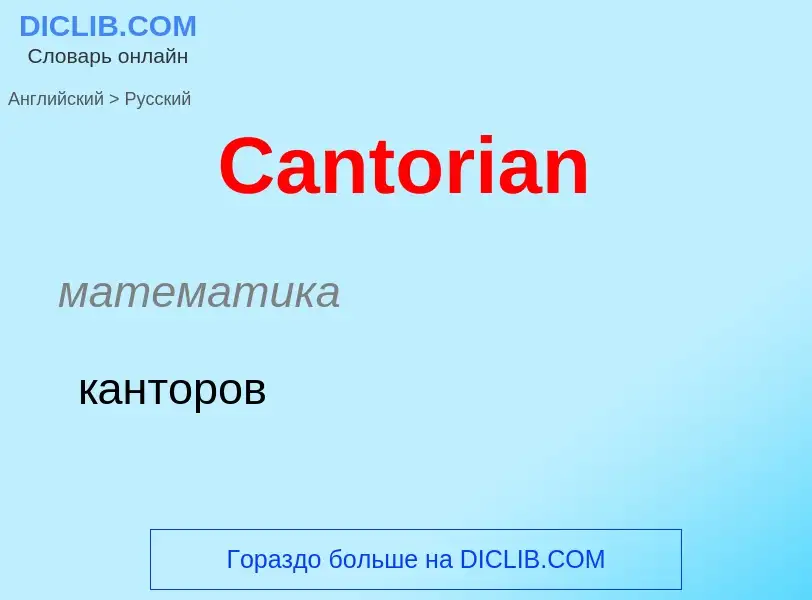ترجمة وتحليل الكلمات عن طريق الذكاء الاصطناعي ChatGPT
في هذه الصفحة يمكنك الحصول على تحليل مفصل لكلمة أو عبارة باستخدام أفضل تقنيات الذكاء الاصطناعي المتوفرة اليوم:
- كيف يتم استخدام الكلمة في اللغة
- تردد الكلمة
- ما إذا كانت الكلمة تستخدم في كثير من الأحيان في اللغة المنطوقة أو المكتوبة
- خيارات الترجمة إلى الروسية أو الإسبانية، على التوالي
- أمثلة على استخدام الكلمة (عدة عبارات مع الترجمة)
- أصل الكلمة
Cantorian - ترجمة إلى الروسية
математика
канторов
ويكيبيديا
.jpg?width=120)
Georg Ferdinand Ludwig Philipp Cantor ( KAN-tor, German: [ˈɡeːɔʁk ˈfɛʁdinant ˈluːtvɪç ˈfiːlɪp ˈkantɔʁ]; March 3 [O.S. February 19] 1845 – January 6, 1918) was a mathematician. He played a pivotal role in the creation of set theory, which has become a fundamental theory in mathematics. Cantor established the importance of one-to-one correspondence between the members of two sets, defined infinite and well-ordered sets, and proved that the real numbers are more numerous than the natural numbers. Cantor's method of proof of this theorem implies the existence of an infinity of infinities. He defined the cardinal and ordinal numbers and their arithmetic. Cantor's work is of great philosophical interest, a fact he was well aware of.
Originally, Cantor's theory of transfinite numbers was regarded as counter-intuitive – even shocking. This caused it to encounter resistance from mathematical contemporaries such as Leopold Kronecker and Henri Poincaré and later from Hermann Weyl and L. E. J. Brouwer, while Ludwig Wittgenstein raised philosophical objections; see Controversy over Cantor's theory. Cantor, a devout Lutheran Christian, believed the theory had been communicated to him by God. Some Christian theologians (particularly neo-Scholastics) saw Cantor's work as a challenge to the uniqueness of the absolute infinity in the nature of God – on one occasion equating the theory of transfinite numbers with pantheism – a proposition that Cantor vigorously rejected. Not all theologians were against Cantor's theory; prominent neo-scholastic philosopher Constantin Gutberlet was in favor of it and Cardinal Johann Baptist Franzelin accepted it as a valid theory (after Cantor made some important clarifications).
The objections to Cantor's work were occasionally fierce: Leopold Kronecker's public opposition and personal attacks included describing Cantor as a "scientific charlatan", a "renegade" and a "corrupter of youth". Kronecker objected to Cantor's proofs that the algebraic numbers are countable, and that the transcendental numbers are uncountable, results now included in a standard mathematics curriculum. Writing decades after Cantor's death, Wittgenstein lamented that mathematics is "ridden through and through with the pernicious idioms of set theory", which he dismissed as "utter nonsense" that is "laughable" and "wrong". Cantor's recurring bouts of depression from 1884 to the end of his life have been blamed on the hostile attitude of many of his contemporaries, though some have explained these episodes as probable manifestations of a bipolar disorder.
The harsh criticism has been matched by later accolades. In 1904, the Royal Society awarded Cantor its Sylvester Medal, the highest honor it can confer for work in mathematics. David Hilbert defended it from its critics by declaring, "No one shall expel us from the paradise that Cantor has created."

.jpg?width=200)
![The title on the memorial plaque (in Russian): "In this building was born and lived from 1845 till 1854 the great mathematician and creator of set theory Georg Cantor", [[Vasilievsky Island]], Saint-Petersburg. The title on the memorial plaque (in Russian): "In this building was born and lived from 1845 till 1854 the great mathematician and creator of set theory Georg Cantor", [[Vasilievsky Island]], Saint-Petersburg.](https://commons.wikimedia.org/wiki/Special:FilePath/Blackboard Georg Cantor (11-line V O building 24).jpg?width=200)


